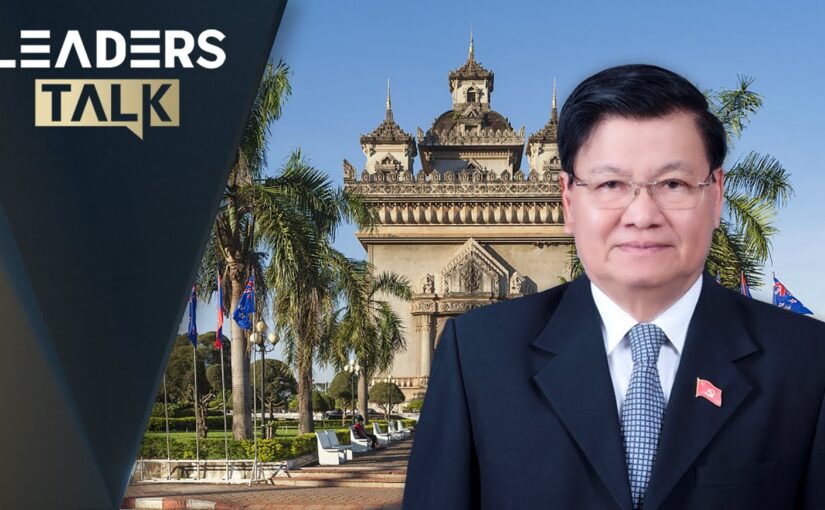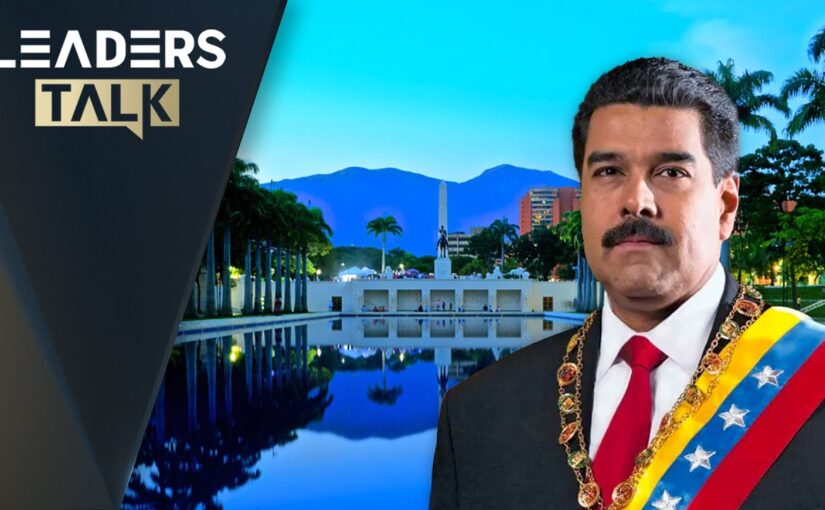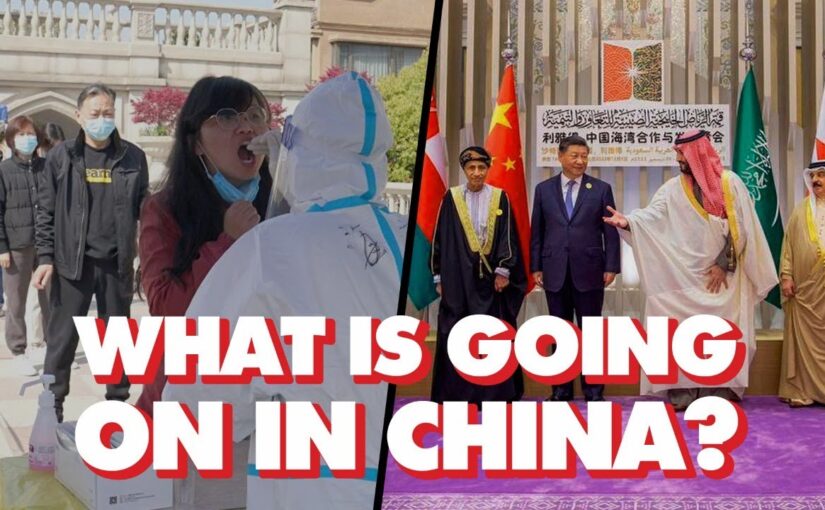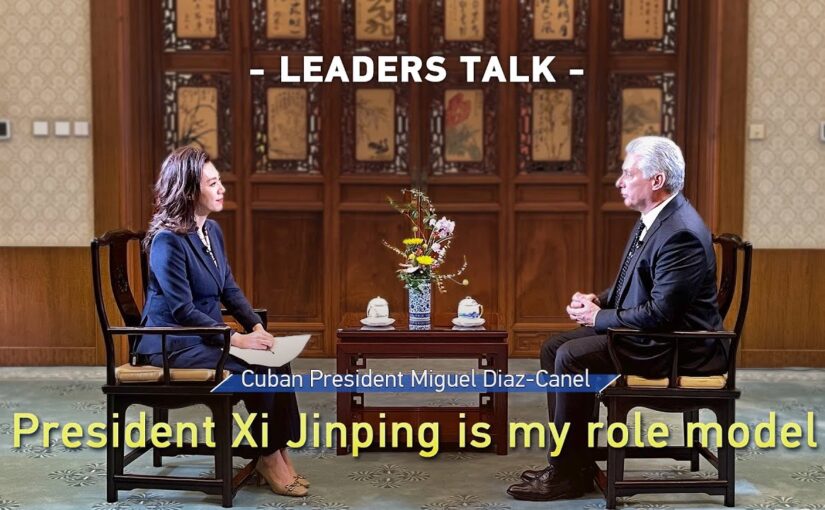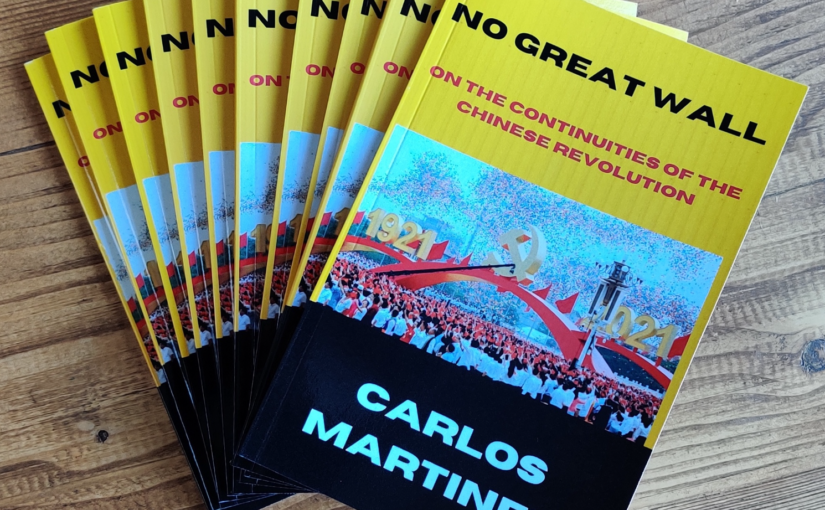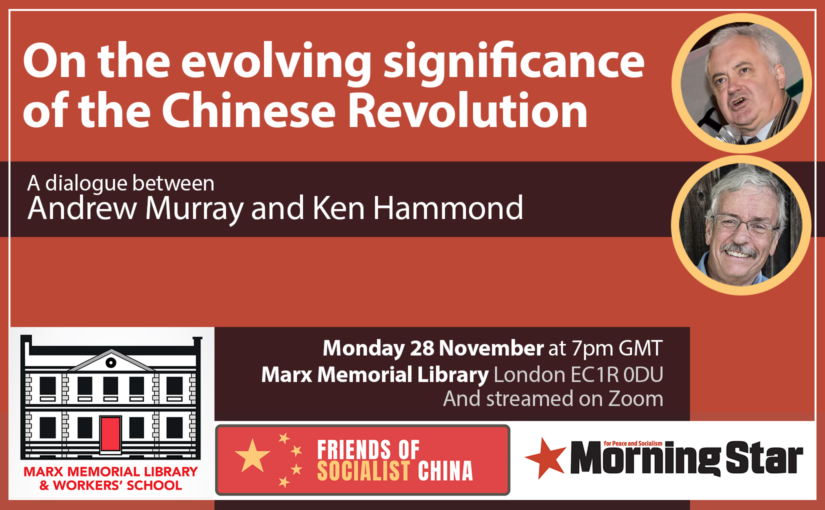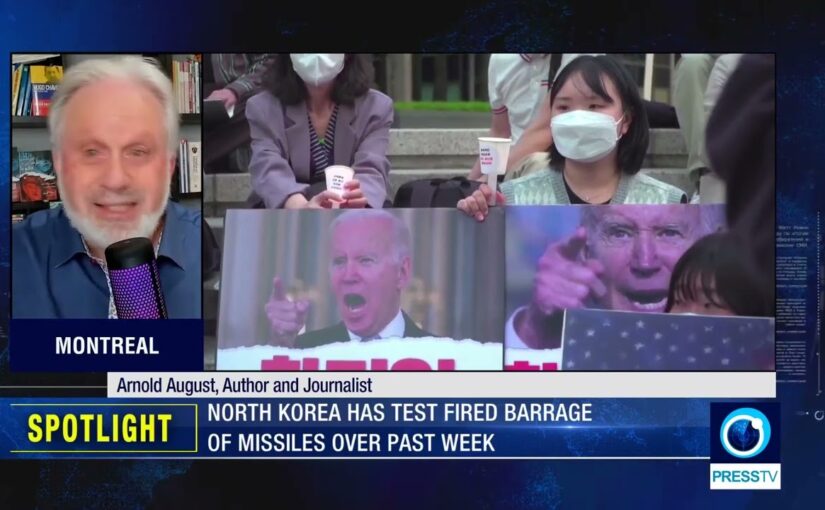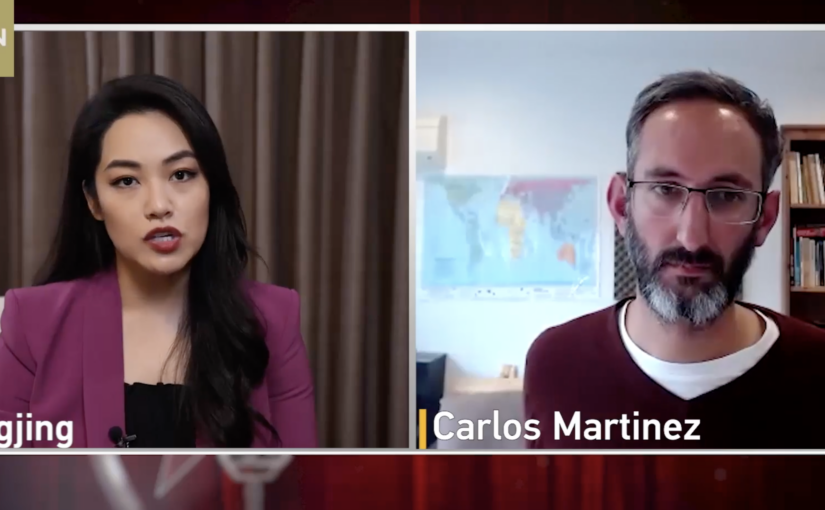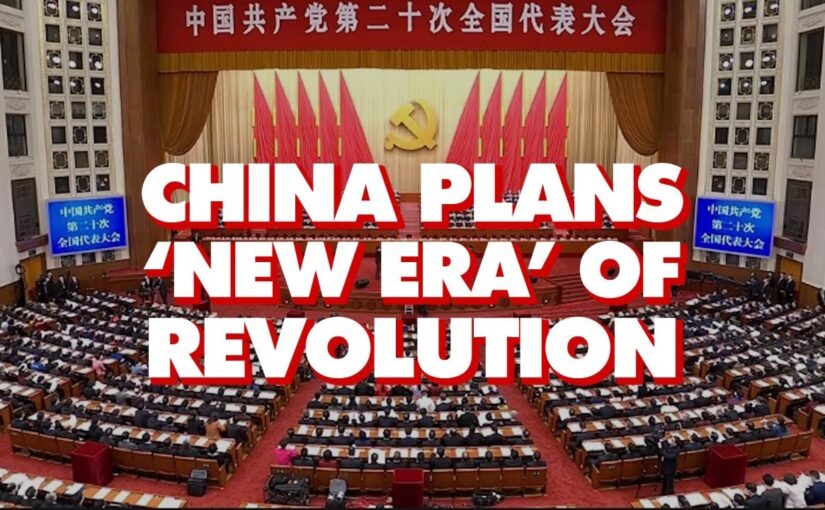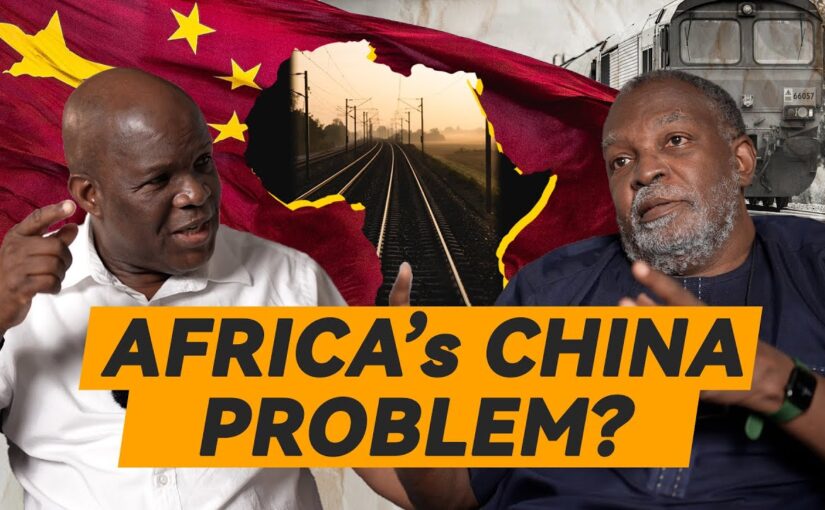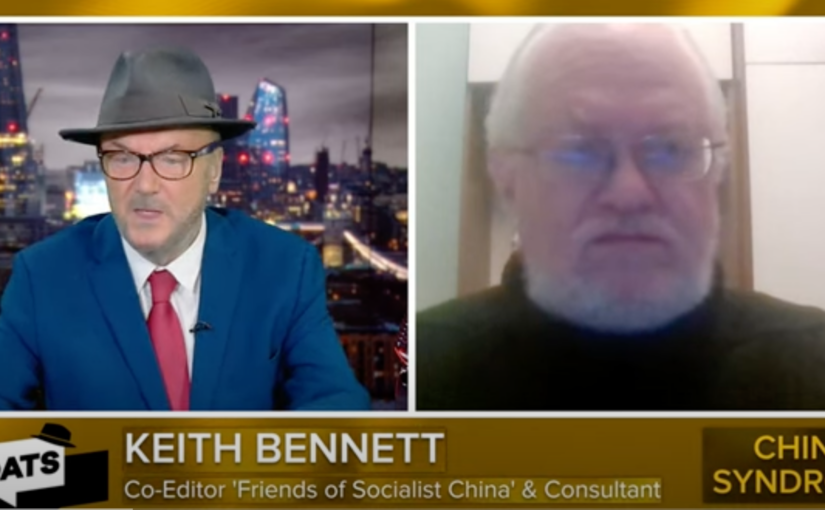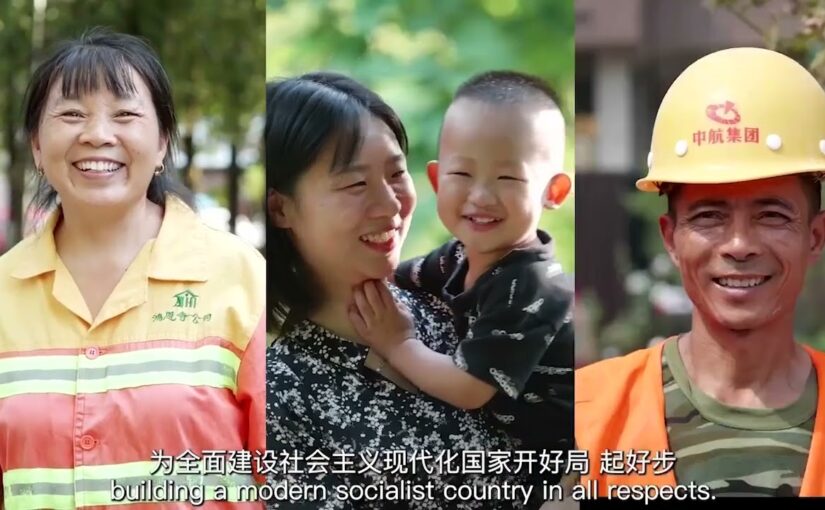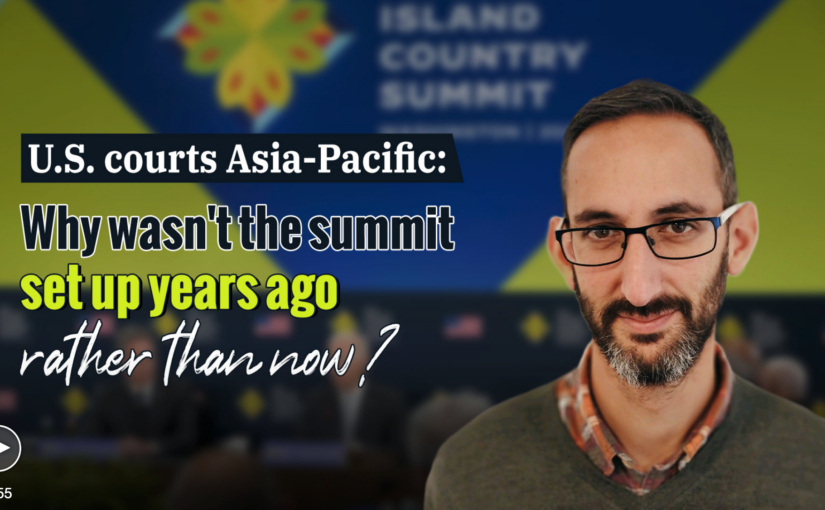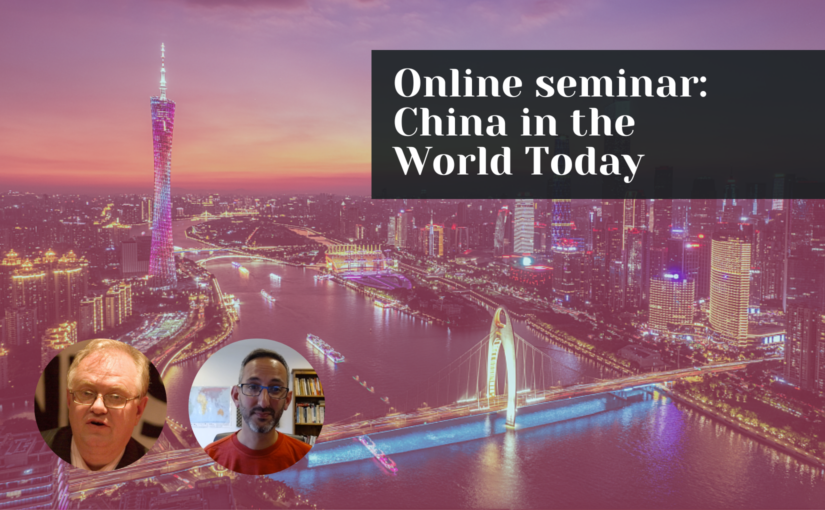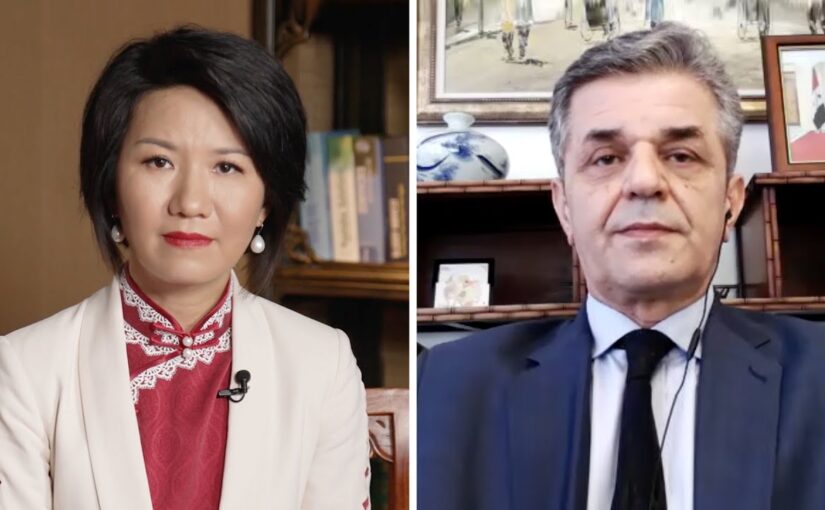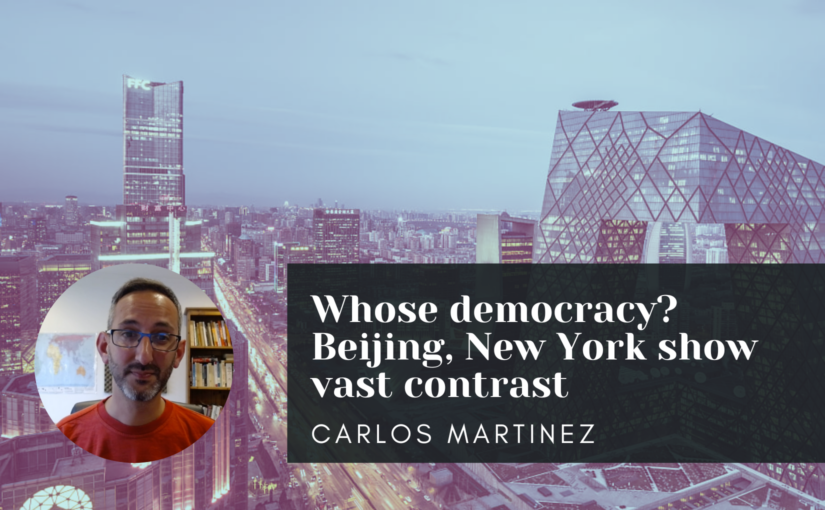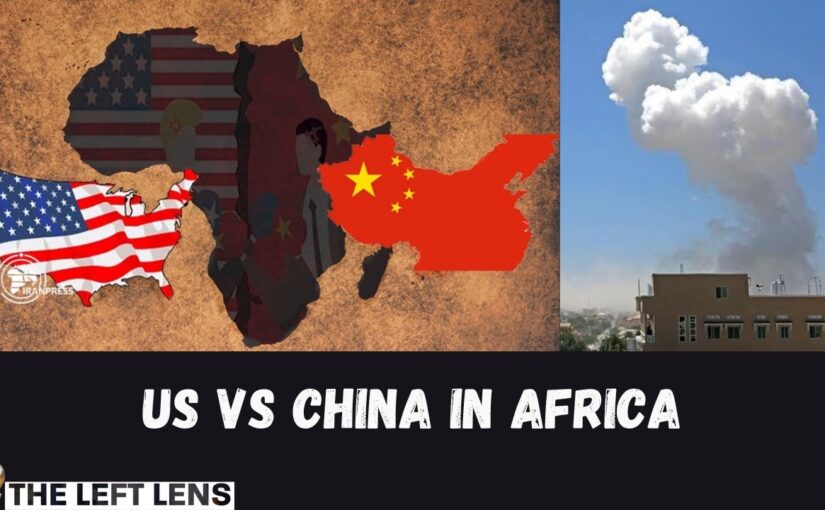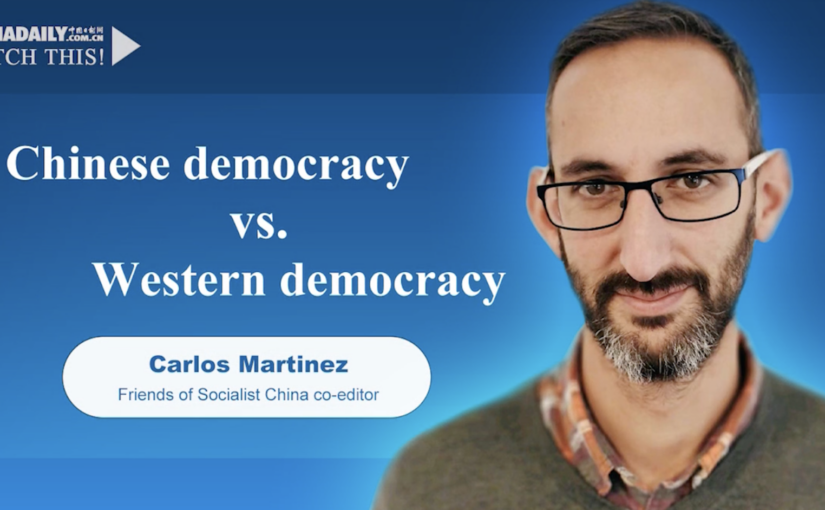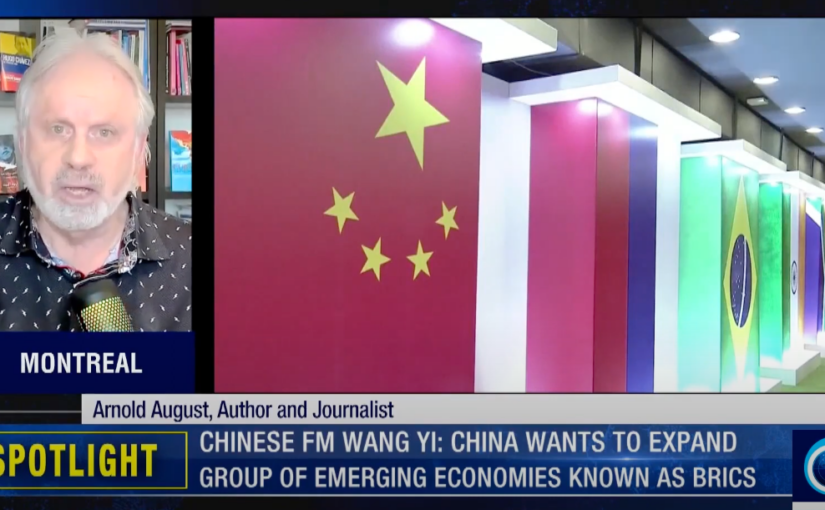In this episode of the new CGTN series Leaders Talk, Zou Yun interviews Thongloun Sisoulith, President of Laos and Secretary-General of the Lao People’s Revolutionary Party.
Describing the inauguration of the Laos-China High-Speed Railway as the dream of the Lao people come true, President Thongloun refers to the long history of brotherly connections between the two countries and peoples, specifically to their helping each other in the fight against foreign aggressors. During the Lao people’s war of liberation, the communist party, army and people of China rendered timely, effective and unconditional support to their Lao comrades, and this friendship, comradeship and brotherhood has continued in the new phase of nation building.
Thongloun recalls his own first visit to China in 1970, when he was a young man in his 20s, working in the Hanoi office of the Lao Patriotic Front. At that time he was escorting 500 students who were to study at the China-Laos Friendship School, which had been established in the city of Nanning in 1967. With Laos facing a brutal US war of aggression, “we sent our kids to China for the Chinese comrades to take care of them.”
Over many subsequent visits to China, Thongloun notes that the Chinese economy has boomed, the country has remained stable, and China has become a pillar of world peace and stability.
He speaks at some length about his impressions of, and personal relationship with, President Xi Jinping, which is clearly characterised by a deep friendship and comradeship. He also talks about the cultural similarities between Laos and China. Noting that China has “many good old revolutionary songs”, he says that he “loves them very much.”
Zou Yun also takes a ride on the high-speed train to get the impressions of some passengers.
The full interview is embedded below.
Category: Video
Nicolás Maduro: China treats Venezuela with friendship and solidarity
China’s CGTN television recently started airing a new interview programme under the name Leaders Talk, with the first ever episode featuring an interview with Indonesian President Joko Widodo, being broadcast to coincide with his hosting of the G20 Summit in Bali last November. As part of the series, CGTN traveled to the Venezuelan capital Caracas for an exclusive and wide-ranging interview with President Nicolás Maduro.
President Maduro details the illegal sanctions and blockade imposed on his country by the United States, which his interviewer rightly describes as an economic war, but notes that despite this, in the last year, Venezuela has managed to achieve economic growth of 17%. Moreover, the country’s non-petroleum economy is growing for the first time in 120 years.
Highlighting the rising multilateral trend in world politics, President Maduro describes his Chinese counterpart Xi Jinping as a thinker of the new era, lauding his concept of a community of shared future for humanity. He also condemns the visit last August by US House Speaker Nancy Pelosi to China’s Taiwan as a challenge to peace and stability and to the One China principle.
Detailing his long friendship with Venezuela’s revolutionary leader Hugo Chávez, Maduro reflects on his own background as a worker, a trade unionist and a militant in the Marxist-Leninist movement, noting that he was once a bus driver and is now the driver of the country, acting in the proletarian spirit and the spirit of Commander-in-Chief Chávez.
Recalling President Xi’s state visit to Venezuela in 2014, Maduro says that the Chinese leader treats Venezuela with friendship and solidarity. US imperialism tightened its blockade during the Covid pandemic, preventing pharmaceutical companies from exporting to Venezuela, but China had not only provided vaccines but also sent its best specialists and experts to his country.
The Venezuelan leader praised the Communist Party of China for putting not only the interests of the Chinese people first but also the interests of the people of the world. Although only screened at the end of December, the interview was evidently filmed just prior to the 20th National Congress of the Communist Party of China, held last October. President Maduro said that he was especially interested in socialism with Chinese characteristics as Venezuela is also building a socialist model with its own features. China’s success, he observes, has provided an important socialist model for the 21st century.
The full interview is embedded below.
Video: What’s going on in China? Protests, Covid, Xi’s Middle East visit
On 14 December 2022, Friends of Socialist China co-editors Danny Haiphong and Carlos Martinez joined Multipolarista editor Ben Norton to discuss recent developments in China.
In the 90-minute stream embedded below, the three discuss some key topics including the recent wave of protests; the changes to China’s management of the pandemic; Xi Jinping’s recent trip to the Middle East; the China-Arab States Summit; China’s position on the Palestinian question; visits to Beijing by Nguyen Phu Trong, Miguel Díaz-Canel and Olaf Scholz; and the death of Jiang Zemin.
The stream was broadcast simultaneously on Multipolarista, The Left Lens, and Friends of Socialist China.
Miguel Diaz-Canel: President Xi Jinping is my role model
In this clip from an interview with CGTN, Cuban president Miguel Díaz-Canel gives his appraisal of his Chinese counterpart, Xi Jinping. Mentioning that he is an enthusiastic reader of Xi’s speeches and writings – which he considers to be a reference point in the development of socialist theory and practice – he also notes the character traits that contribute to Xi’s leadership style. He describes Xi as “a profound thinker… austere, modest, but also demanding”. Xi Jinping “has the virtue of always thinking about the wellbeing of his people.”
The clip is embedded below. CGTN have also released the following clips:
Cuban president: Cuba to resolve energy shortage through cooperation with China
Cuban president: Goal, vision of Chinese-style modernization very advanced, scientific
Cuban president: Global development, security initiatives in interest of all peoples
New booklet: No Great Wall: on the continuities of the Chinese Revolution
The comrades at Midwestern Marx have produced a booklet based on two essays by Friends of Socialist China co-editor Carlos Martinez, ‘No Great Wall: on the continuities of the Chinese Revolution’, and ‘Will China Suffer the Same Fate as the Soviet Union?’. The book description reads as follows:
In “No Great Wall: On the Continuities of the Chinese Revolution”, Carlos Martinez concisely traces the history of the Chinese revolution from the formation of the Communist Party of China in 1919, to the current Xi Jinping era. Contrary to those who argue there was a betrayal of the revolution in 1978 with Deng Xiaoping’s Reform and Opening Up, Martinez lucidly shows how the Chinese revolution has been a continuous process, adjusting its governance in accord to changes in national and geopolitical contexts.This collection also includes the essay “Will China Suffer the Same Fate as the Soviet Union?” which relates the development of the Chinese revolution to the Soviet, and “The CPC: The Most Successful Political Party in History,” which reflects on the successes of the Chinese revolution following the 20th National Congress of the CPC.
You can order the book from anywhere in the world at the Midwestern Marx website.
Also embedded below is a recent two-hour discussion between Carlos and Midwestern Marx. They cover a number of important topics, including the conflict in Ukraine, the legacy of the Soviet Union, China’s ecological civilisation, market socialism, the New Cold War, and the 20th National Congress of the CPC.
Video: On the evolving significance of the Chinese Revolution, with Andrew Murray and Ken Hammond
On 28 November 2022, Friends of Socialist China organised, jointly with the Morning Star and Marx Memorial Library, a dialogue between Andrew Murray and Ken Hammond on the evolving significance of the Chinese Revolution. The event, conducted both in-person at the Marx Library and online via Zoom and YouTube, was very interesting and useful, with both panelists making highly insightful remarks, and a lively discussion following the panelist introductions.
About the participants
Andrew Murray is vice-president and founding chair of Stop the War Coalition, a longstanding trade unionist, peace campaigner, and one of the leading thinkers of the British left. He has written a number of books, including most recently ‘Is Socialism Possible in Britain?’, reflecting on his time serving as a political advisor to Jeremy Corbyn. Andrew has maintained an active interest in China for several decades, and has been vocal in his opposition to the New Cold War.
Ken Hammond is a professor of East Asian and Global History at New Mexico State University. He was a student organiser at Kent State University at the time of the shocking incident of 4 May 1970, when the Ohio Army National Guard shot and killed four students peacefully protesting the invasion of Cambodia when Nixon escalated the Vietnam War, and was indicted as one of the ‘Kent 25’. Ken lived and worked in Beijing between 1982 and 1987 managing activities for American educational delegations.
Ken earned his PhD in History and East Asian Languages from Harvard University in 1994, and has worked in support of friendly US-China relations for many decades. He is a founder of the US-based movement Pivot to Peace, set up in 2020 in response to the escalating anti-China rhetoric emanating from US politicians and media. He is an Associate Editor of the Journal of Chinese History, published by Cambridge University Press, and the author of several books, including From Yao to Mao: 5,000 Years of Chinese History. Over the years he has taught at universities in Beijing, Shanghai and Shijiazhuang.
The dialogue was moderated by Roger McKenzie, International Editor of the Morning Star, and introduced by Iris Yau.
Arnold August: China’s rise is the West’s main fear
We are pleased to reproduce extracts of the November 13, 2022, edition of Press TV’s show Spotlight on the current South China Sea tensions, with Canadian author/journalist Arnold August and Teheran-based anchor/producer Kaveh Taghvai. August focused on China, the BRICS alternative non-US dollar currency as a very significant challenge to US hegemony, and the US vision for leveraging Taiwan against the People’s Republic of China, much as Ukraine is today being used as a pawn in the US/NATO war against the Russian Federation.
Video: China’s socialist development model speaks for itself
In the video below, originally carried on CGTN, Li Jingjing interviews Carlos Martinez about the recently-concluded 20th National Congress of the CPC – in particular its focus on common prosperity – as well as the successes of China’s development model.
Carlos outlines the core principles of common prosperity – reducing poverty, reducing inequality, improving distribution, and increased regulation of capital. He highlights in particular the measures that have already been taken in support of workers in the ‘gig economy’, including recent legislation supporting and encouraging unionisation, and mandating that all workers have proper contracts and full insurance entitlement. These measures compare very favourably with the situation in the West, where casual workers face terrible working conditions, zero-hour contracts and anti-union policies.
Discussing China’s development model of Socialism with Chinese Characteristics, Carlos points out that the successes of this model speak for themselves. It is a model that has been able to eliminate extreme poverty in a huge country of 1.4 billion people – an unprecedented achievement. “Anyone saying it’s a bad model is saying that it’s bad for people who used to face famines to now live comfortable lives.”
Video: China plans new era of revolution in 20th CPC national congress
On 21 October 2022, Friends of Socialist China co-editors Danny Haiphong and Carlos Martinez joined Multipolarista editor Ben Norton to discuss the CPC’s 20th National Congress, currently drawing to a close in Beijing.
In the 90-minute stream embedded below, the three discuss some of the key themes emerging from the Congress, including the pursuit of China’s Second Centenary Goal (“building a great modern socialist country that is prosperous, strong, democratic, culturally advanced, harmonious and beautiful”), common prosperity, ecological civilization, whole-process people’s democracy, and the need for self-reliance and military modernization in the face of escalating hostility from the imperialist countries.
The stream was broadcast simultaneously on Multipolarista, The Left Lens, and Friends of Socialist China.
Video: When the West visits Africa, they talk about China
We are pleased to reproduce this video from Wave Media featuring a dialogue between Fred M’membe, President of the Socialist Party of Zambia, and Kyeretwie Opoku, Convenor of the Socialist Movement of Ghana, two of the new-emerging Marxist parties in Africa, on the question of relations between Africa and China.
According to the discussants, China is not an enemy of Africa. China has never attempted to colonize an African country and still has no ambitions to do so. In contrast, they note that the imperialist powers, particularly the United States, are increasingly trying to recolonize the continent. With their setting up of more military bases, their aim is both to suppress popular revolts as well as to exclude those they deem to be external competitors. The US and other Western powers are not there to defend the local people but rather their control of strategic minerals. The Democratic Republic of Congo (DRC) has an estimated 70% of the world’s cobalt resources, and neighboring countries like Zambia, Namibia and Niger are also rich in cobalt, uranium and other minerals. A Nigerien uranium mine supplies one third of France’s electricity. In one of the world’s poorest countries, people are being poisoned for generations to come by having to work in this open-pit mine.
When the west was colonizing Africa, the discussants note, China was supporting the liberation struggle, and subsequently helped defend Africa’s newly won independence. A key example was the Tazara Railway, which enabled landlocked Zambia to break out of its blockade and encirclement by countries still then under racist and colonial rule. Both the United States and Britain refused to help build the railway, but China stepped in, even though it had no comparable railways of its own at that time and many African countries had a higher GDP per capita than China. Today, almost all the major new infrastructure projects to be seen in Africa have been built by China.
Similarly, in the 1970s, Zambia was repeatedly bombed by the white racist regimes in South Africa and ‘Rhodesia’. The country had no air defenses to protect its territory or the bases of the national liberation movements it was hosting. The Americans, British and even the Soviet Union refused to sell air defenses to Zambia. China was the only country prepared to aid Zambia in this way, sending an entire squadron of MiG21s, even though China itself possessed only limited defenses at that time.
Video: Why has China suddenly become a ‘threat’ to the UK?
In the video embedded below, FoSC co-editor Keith Bennett discusses with George Galloway the recent decision by the British state to designate China as a security threat. Keith points out that this reflects a foreign policy trajectory in Britain of providing unquestioning support to the US; essentially outsourcing its foreign policy to Washington, which, starting with Obama’s Pivot to Asia and then escalating through the Trump and Biden administrations, seems intent on waging a New Cold War to contain China and suppress its rise.
George and Keith both observe that, just a few years ago, Britain and China were enjoying a ‘golden era’ of relations. Britain under the Cameron-Osborne administration was strongly encouraging trade with, and investment from, China. Indeed, Keith points out that British Steel would have gone out of business had it not been acquired by a Chinese company. At that time, the British government was operating on the (correct) basis that good relations with China were positive for the British economy. The idea that China has suddenly become more aggressive or changed its basic policy orientation is absurd: China isn’t sailing gunboats through the Solent; rather Britain is sailing its warships through the Taiwan Strait and forming a nuclear alliance with Australia and the US. British policy-makers have clearly decided, counter to the interests of the British economy, to join in with the US-led hybrid warfare against China. Nothing good will come of this strategy for the British people.
Video: on Xi Jinping’s ‘The Governance of China’, Volume IV
With the 20th National Congress of the Communist Party of China scheduled to open on October 16, the International Department of the Communist Party of China has released this short video highlighting the publication of Volume IV of President Xi Jinping’s collection of articles and speeches, The Governance of China.
The video highlights how China has achieved its first centenary goal (marking 100 years since the founding of the Communist Party of China in 1921) of building a moderately prosperous society in all respects, with the complete elimination of extreme poverty, and is now advancing towards the second centenary goal (which will mark 100 years since the founding of the People’s Republic of China in 1949) of building a great modern socialist country in all respects.
President Xi points out that China is now closer than ever before to realizing its cause of national rejuvenation and more confident than ever of achieving it.
The video also outlines the Chinese leader’s thinking on building a community with a shared future for humanity, highlighting in particular China’s global supply of vaccines and the role of the Belt and Road Initiative (BRI) in poverty alleviation, along with China having signed BRI agreements with 149 countries and 32 international organizations.
Why wasn’t the US-Pacific Island Country Summit set up years ago?
In the video embedded below, produced by and originally published on CGTN, FoSC co-editor Carlos Martinez responds to questions about why the US is suddenly showing an interest in the islands of the Pacific, and why the recent US-Pacific Island Country Summit wasn’t held years ago. Carlos notes that the US and the other imperialist powers have almost totally ignored these small nations in the post-colonial era. Their attention has been drawn by a blossoming and mutually-beneficial relationship between the Pacific Island countries and the People’s Republic of China. Of particular concern was the security agreement between China and the Solomon Islands, signed in April 2022.
Carlos points out that China has never had a colonial relationship with these countries, but is very willing to provide aid, trade, and investment; furthermore, it works with these countries without attempting to compromise their sovereignty. Unfortunately, this runs counter to the US’s evolving strategy of encircling and containing China.
Transcript
CGTN: Since Joe Biden came to office, the U.S. has put greater focus on the Asia-Pacific. What caused this shift?
Martinez: The difference between Donald Trump and Biden in terms of their approach to the Pacific Islands really reflects the overall difference in their foreign policy. Trump’s motto was “America First.” His administration didn’t really pursue alliances, but talked quite openly about the need to maintain U.S. hegemony.
Now, Biden’s foreign policy is somewhat more sophisticated than Trump’s, but he’s seeking ultimately the same thing as Trump. He’s seeking to consolidate and expand U.S. hegemony, U.S. imperialism, but he wants to do it in a more consensual way. He wants to build an alliance.
CGTN: Beijing in April signed a security pact with the Solomon Islands. In contrast, the country seemed to keep its distance from the U.S., given that the Prime Minister skipped a planned appearance with Wendy Sherman during her Asia Pacific trip in August. How do you explain the contrast between the Solomon Islands’ attitudes toward the U.S. and China?
Martinez: The fact is that in recent decades, the imperialist powers have almost completely ignored the Pacific Island countries. They’ve been left to try and overcome the legacy of a century of colonialism, a century of underdevelopment on their own. Many of these countries suffer terrible poverty, terrible inequality. Many of them struggle with high crime rates, with ethnic tensions. And these problems are largely a product of their colonial history, but the former colonizers don’t apparently feel any sense of responsibility toward them.
China, on the other hand, is a nearby major power. There has never been a colonial relationship with these countries, but it is very willing to provide aid, trade, and investment, that’s very willing to help these countries to develop without compromising their sovereignty. This will make sense for the Solomon Islands and for the other Pacific countries, but it’s the opposite of what the U.S. wants as part of its strategy of China encirclement.
That’s the reason for this kind of sudden flurry of diplomatic activity in the region. That’s the reason for this forthcoming U.S.-Pacific Island Country Summit. That’s the reason for the U.S., Australia, Japan, and Britain forming this Partners in the Blue Pacific. These are imperialist powers that are doing everything they can to prevent normal and mutually beneficial relations between China and the Pacific Island countries, the reason being that they insist on the whole region being part of a so-called sphere of influence, in which the people of the region are just sort of humble pawns in the U.S.’s imperial chess game.
CGTN: Why wasn’t the summit set up years ago rather than now?
Martinez: What the summit represents is an example of the cold war mentality. Why has the United States suddenly decided that it cares about its relationship with the islands of the Pacific? The reason is because those islands have increasingly good relations with China, and because China has emerged as a major trading partner of those islands. China is the principal supplier of COVID-19 vaccines to these islands. China’s working very strongly with these countries around climate change issues, which are having a very heavy impact on the islands of the Pacific.
The United States, not wanting to see China having good relations with these countries, suddenly decides that it will have a conference. It will have a summit and it will try and essentially bribe these countries back into the U.S. camp.
The Biden administration is paying much more attention to the Pacific Islands because he wants to incorporate these countries into an anti-China alliance so that they can form another island chain and used potentially to intimidate or to blockade China.
The bigger picture is that the U.S. economy has essentially run out of steam. There’s no question of the U.S. matching the dynamism of the Chinese economy. China has become by far the world leader in new energy, telecommunications, 5G, nanotechnology and several other key areas. Average life expectancy in China has now overtaken that of the U.S. So increasingly, ordinary Chinese people are living longer and living better than their counterparts in the U.S., and the U.S. sees this as a threat and it’s responding to this threat with what I think we should agree is a very dangerous militarization and by resorting to cold war strategies, block-based politics, division, and decoupling.
This runs counter to the interests of the American people. It runs counter to the interest of the Chinese people, and it runs counter to the interest of the people of the world.
Seminar: China in the World Today
Britain’s General Federation of Trade Unions (GFTU) initiated an autumn series of online seminars, under the theme The Bigger Picture, on September 15, by inviting Friends of Socialist China co-editors Carlos Martinez and Keith Bennett to introduce on the theme ‘China in the World Today’. Chaired by GFTU General Secretary Doug Nicholls, Carlos kicked off with a look at China’s domestic situation, focusing on poverty elimination and preventing climate catastrophe. Keith followed, addressing the questions of Taiwan and the relations between China, Britain, and the US. A lively discussion ensued, which could certainly have gone on for much longer.
Next events in the series will feature Dr. Francisco Dominguez, academic, activist and member of our advisory group, who will speak on the Decline of US imperialism on October 20; and our friend Dr. Kate Hudson, General Secretary of the Campaign for Nuclear Disarmament (CND), who will speak on NATO Friend or Foe on November 17. You can register for these events at The Bigger Picture: Autumn Series of Online Seminars – GFTU.
The GFTU is pleased to facilitate informed debate and critical thinking about many subjects in its education programme and the views of speakers and participants do not necessarily reflect those of the GFTU.
Why the US wants to destroy China and Russia: Nicaraguan President Daniel Ortega explains
We are very pleased to reproduce this key extract from an important speech by Daniel Ortega, President of revolutionary Nicaragua, with thanks to our friends at Multipolarista. As a multipolar world emerges, Comrade Ortega explains, the US is trying desperately to maintain its hegemony by attempting to destroy the Russian Federation, the People’s Republic of China and the economies of the European countries.
What harm, Ortega asks, has People’s China done to the United States or to the peoples of the world – to the peoples of Latin America, the Caribbean, Africa or Asia. What worries them rather is that China is providing benefits to these peoples, so the United States is losing its power to keep them enslaved.
Speaking on the day that US House Speaker Pelosi arrived in Taiwan, Ortega said that he was sure that the Chinese people, under the leadership of President Xi Jinping, have the strength, intelligence and experience to formulate the correct response that will further strengthen the People’s Republic and weaken US hegemony.
Amidst all these tumultuous events, the veteran Nicaraguan revolutionary leader points out, a new world is being born, something to which Nicaragua and its people are contributing their little grain of sand every day.
Syrian Ambassador: Muslims in Xinjiang experience greater freedom than Muslims in the West
The below extract from CGTN’s popular The Point features an interview with Syria’s Ambassador to China, HE Muhammad Hasanein Khaddam.
Although relatively new in his ambassadorial role, this is his second posting to China. Broadcast on September 7, the ambassador was one of a group of diplomats from 30 Muslim majority countries who had recently paid a visit to Xinjiang. Describing the region as an oasis, Ambassador Khaddam said the gap between what they saw with their own eyes and what is presented in the west is unbridgeable.
However, this did not surprise him, as the same lies had been told about his own country during 12 years of war waged by terrorist groups and the western powers. Muslim people in Xinjiang, he pointed out, enjoy freedoms that can’t be enjoyed by their co-religionists in many western countries that criticise China.
Turning to the situation in Syria, the Ambassador notes that the Belt and Road Initiative (BRI), that Syria formally joined at the beginning of this year, brings hope of a new modality of ‘win win’, without dictation or disrespect. Companies from friendly nations that stood with Syria, he explains, will enjoy numerous opportunities in the reconstruction of the country, such as in the building of ports, roads, bridges and a railway to Iraq.
Video: Whose democracy? Beijing, New York show vast contrast
The video embedded below is the last in a three-part series on democracy made by China Daily, based on an interview with Friends of Socialist China co-editor Carlos Martinez. In this segment, Carlos talks about visiting both New York City and Beijing for the first time in 2019, and the stark contrast between the two cities. New York, in spite of being a major centre of wealth, contains terrible levels of poverty, inequality, homelessness and discrimination, and its infrastructure is collapsing. Beijing on the other hand is modern, efficient, clean and well-organised, and the fundamental human rights of all its citizens are guaranteed. What this small example reflects is the difference between Western democracy – a democracy for the elite – and Chinese socialist democracy, which works for the masses of the people.
Danny Haiphong: Does China practice imperialism in Africa?
In this video breakdown on the Left Lens, co-editor of Friends of Socialist China Danny Haiphong analyzes China’s recent announcement that 23 interest-free loans to 17 African nations will be forgiven in the context of its broader relationship with the continent. Haiphong argues that China not only provides more flexible loan terms but also prioritizes the industrial development and export markets of African nations, something Western imperialism has never done.
Video: China’s democracy serves the people
The video embedded below is the second in a three-part series on democracy made by China Daily, based on an interview with Friends of Socialist China co-editor Carlos Martinez. In this segment, Carlos contrasts Western capitalist democracy with China’s socialist democracy, observing that the political process prevailing in countries such as the US and Britain is closer to plutocracy than democracy, owing to the persistent connection between wealth and power. “In the US, you can choose between Democrats and Republicans, but both are going to represent the capitalist class; and both are going to pursue American imperialism.” Giving an overview of the structures of China’s whole-process people’s democracy, he concludes that China is much more meaningfully democratic than the capitalist world.
Part 1 of the series can be viewed here.
Arnold August: BRICS expansion in the context of rising multipolarity
We are pleased to reproduce extracts from the May 21st edition of the Spotlight programme of Iran’s Press TV, in which Canadian activist and political analyst, focused on Latin America and China, Arnold August assesses the significance of the May 19th virtual meeting of the foreign ministers of the BRICS powers (Brazil, Russia, India, China and South Africa) which backed a Chinese proposal to expand the group’s membership to other emerging economies and developing countries. This will be the first such expansion since South Africa joined the original group in December 2010. August outlines the significance of this move, specifically in terms of building opposition to the new cold war and promoting multipolarity. He also contrasts this inclusive approach to the US moves to exclude such countries as Cuba, Venezuela and Nicaragua from the proposed Summit of the Americas scheduled for next month.
